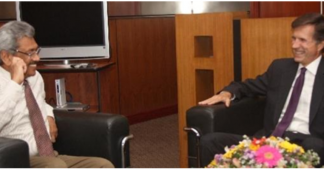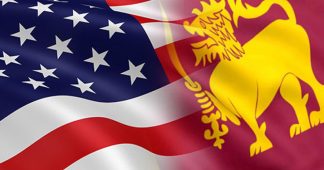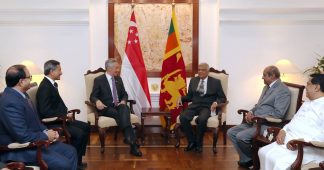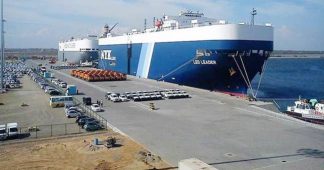By Lasanda Kurukulasuriya
While the contents of the proposed Status of Forces Agreement (SOFA) between the governments of Sri Lanka and the US still remain hidden from the public eye, parliament was told last week that the government had not entered into such an agreement – yet. The negotiations however are going on. Foreign Minister Tilak Marapana during his visit to Washington from 15th-17th May reportedly indicated to the US that some of its provisions could not be implemented. One was the provision seeking exemption for visiting US personnel from criminal jurisdiction under Sri Lankan law, while in Sri Lanka. Another was a clause that would give effect to the agreement through an ‘exchange of notes.’
Marapana has also indicated that the Government of Sri Lanka (GSL) could not agree to clauses that sought diplomatic privileges and immunities for US personnel (defined as members of the US armed forces and civilian employees of the US Department of Defense) under this agreement.
Questions about the SOFA have repeatedly been asked in parliament by Opposition MPs who have quoted in detail, presumably from a draft they have seen. Dayasiri Jayasekera and Bimal Ratnayake are among the MPs who warned of serious consequences of entering into the proposed defence pact which, by all accounts, is extremely one-sided.
The SOFA currently under negotiation seeks to update a 1995 agreement between the US and Sri Lanka. The 1995 document too carried an immunity clause. Explaining why that provision could no longer be supported, a highly placed source familiar with the discussions explained that it was owing to the fact that Sri Lanka passed the ‘Diplomatic Privileges Act No. 9 of 1996.’ Since it came into effect, any granting of diplomatic privileges and immunities has to be published in a gazette and tabled in parliament. Besides, the categories of personnel in the newly proposed SOFA have also expanded. “In 1995 there was nothing called ‘contractors,’ but this agreement covers them as well” he said. These issues have been explained to the US. Originally the ‘exchange of notes’ was very straightforward. Now there are issues in three areas: the content of the agreement, whom it covers and how to pass it, the source said. He was emphatic that there is “No agreement yet.”
The US ambassador in Colombo Alaina Teplitz has recently made some public statements about the SOFA, which she referred to as a ‘visiting forces agreement.’ She sought to present it as an innocuous document dealing with ‘largely logistical and administrative’ matters relating to ‘visiting forces engaged in exercises,’ and mundane issues like mutual recognition of professional licenses, fees for professional services, and how US personnel can enter and exit Sri Lanka etc.
These remarks are somewhat disingenuous. Under the proposed agreement “Sri Lanka shall accept as valid all professional licenses issued by the United States, its political subdivisions, or States thereof…” said Dayasiri Jayasekera in parliament in January. “This means they would not be subjected to be screened or checked by law enforcement officers of Sri Lanka, even by a traffic cop,” the SLFP MP pointed out. The proposed SOFA is said to call for a waiver of license fees, taxes, duties and the like for visiting US personnel, and seeks to allow them to enter Sri Lanka without passports, using US identification documents instead. There is nothing ‘mutual’ about any of this.
Confidential Diplomatic Note
Other details from the US-proposed pact were described by Asian Tribune correspondent Daya Gamage in an article on Thursday (23). The SOFA under negotiation relates to a confidential Diplomatic Note from the US embassy to the foreign ministry dated 28th August 2018, reveals Gamage, a former US State Department political specialist. He indicated Asian Tribune has seen the document. Quoting from it he listed the following provisions in the proposed SOFA:
– The US embassy ‘reminds the GSL’ that “as a result of these discussions the Embassy proposes that U.S. personnel be accorded the privileges, exemptions, and immunities equivalent to those accorded to the administrative and technical staff of a diplomatic mission under the Vienna Convention on Diplomatic Relations; that U.S. personnel may enter and exit Sri Lanka with U.S. identification and with collective movement or individual travel orders”.
- “The Government of Sri Lanka recognizes the particular importance of disciplinary control by U.S. Armed forces authorities over U.S. personnel and, therefore, authorizes the Government of the United States to exercise criminal jurisdiction over U.S. personnel while in Sri Lanka.”
- “…the U.S. Department of Defense and U.S. personnel shall not be liable to pay any tax or similar charges within Sri Lanka. The U.S. Department of Defense and U.S. personnel may import into, export out of, and use in Sri Lanka any personal property, equipment, supplies, material, technology, training, or services in connection with activities under this agreement. … They shall be exempt from any inspection within Sri Lanka.”
– “The Embassy proposes that vessels and vehicles operated by or, at the time, exclusively for the U.S. Department of Defense may enter, exit, and move freely within the territory of Sri Lanka. The discussions so far held between the GSL and USG in Colombo and, most recently in Washington highlighted “Aircrafts and vessels of the U.S. Government shall be free from boarding and inspection.”
– The Embassy also proposes that the U.S. Department of Defense may contract for any material, supplies, equipment, and services (including construction) to be furnished or undertaken in Sri Lanka without restriction as to choice of contractor, supplier, or person who provides such material, supplies, equipment or services. Such contracts shall be solicited, awarded and administered in accordance with the laws and regulations of the Government of the United States of America. Acquisition of articles and services in Sri Lanka by or on behalf of the U.S. Department of Defense in connection with activities under the Agreement shall not be subject to any taxes or similar charges in Sri Lanka.
- “The Embassy proposes that U.S. personnel shall have freedom of movement and access to and use of mutually agreed transportation, storage, training, and other facilities required in connection with activities under this Agreement.”
- The Government of Sri Lanka recognizes that it may be necessary for the U.S. Armed forces to use the radio spectrum. The U.S. Department of Defense shall be allowed to operate its own telecommunication system. This shall include the right to utilize such means and services as required to ensure full ability to operate telecommunication system. The use of the radio spectrum shall be free of cost to the U.S Government.
- The classified diplomatic communication dated 28 August 2018 sent to the Sri Lanka Ministry of Foreign Affairs at the conclusion states that (Quote) If the foregoing is accepted to the Government of the Democratic Socialist Republic of Sri Lanka, the Embassy proposes that this note, together with the Ministry’s reply to that effect, shall constitute an agreement between the two Governments, which shall enter into force on the date of the Ministry’s reply.” (End Quote)
Exemptions for contractors
Jayasekera in parliament on 18.01.19 gave further information regarding the contents of the SOFA in relation to ‘contractors’ brought in by the US Department of Defense:
– “The Embassy further proposes that U.S. contractors shall not be liable to pay any tax or similar charge assessed within Sri Lanka in connection with activities under this Agreement and that such contractors may import into, export out of, and use in Sri Lanka any personal property, equipment, supplies, materiel, technology, training, or services in fulfillment of contracts with the U.S. Department of Defense in connection with activities under this Agreement. Such importation, exportation, and use shall be exempt from any license, other restrictions, customs duties, taxes, or any other charges assessed within Sri Lanka.”
– “The Embassy proposes that U.S. contractors shall be granted the same treatment as U.S. personnel with respect to professional and drivers’ licenses.”
– “Sri Lankan authorities shall accept as valid, without a driving test or fee, driving licenses or permits issued by the appropriate U.S. authorities to U.S. contractors of the operation of vehicles.”
The US embassy has repeatedly asserted that the US has ‘no plans to establish a military base’ in Sri Lanka. But then, in recent times that’s not the approach used by the superpower in extending its military footprint. Nowadays the US gets its ‘partners and allies’ to share part of the burden of meeting shared goals. The US’s mantra of a ‘free and open Indo Pacific’ illustrates the strategy, with Japan, India and Australia asked to join in pushing back against China’s growing maritime power. Meanwhile the US finds it useful (and economical) to negotiate bilateral agreements with individual strategically located states.
Lack of transparency
While the US in its global power games will doubtless benefit from having an agreement that gives carte blanche to its forces personnel while in Sri Lanka, how can such a deal benefit the host country? Doesn’t the question arise as to whether Sri Lanka needs a SOFA in the first place?
The dangers of entering into such agreement would seem self-evident. Its demands if granted would amount to a blatant violation of sovereignty. Wouldn’t bringing in a category of foreign, armed, service personnel who are above the law of the land, in effect turn the entire Sri Lankan population into second-class citizens in their own country?
Sri Lanka is asked to forego the rights of a sovereign state out of deference to the superpower in exchange for nothing, it would appear. Since there is no visible payoff, a question that needs to be asked is whether there is a hidden element of blackmail at work. These demands are being made at a time when Sri Lanka is on the mat in Geneva, largely thanks to the United States – the main architect of a resolution against the state, particularly inimical to its armed forces.
When US’s Mike Pompeo was interviewed on a programme called ‘Intelligence Matters,’ days after the April 21st ISIS-linked terror attacks in Sri Lanka, he was asked how, as Secretary of State, he managed to ‘balance’ the demands made on the US’s allies and partners in the matter of dealing with China. His reply might give a clue to the dynamic at work here. He said “Yeah, you smile and shake hands on the things you agree on, and then arm wrestle on those that you don’t. And you do so with the seriousness that you recognize they’re a sovereign nation, they have their own interests. We have ours.’”
The government’s lack of transparency on this deeply troubling agreement only serves to rouse suspicion and encourage rumour. As the Chief Prelate of the Malwatte Chapter (the largest Buddhist sect in Sri Lanka) politely told ambassador Teplitz, who paid a call on him on Thursday, it would be best for the document to be revealed so that the public will know what’s in it.










